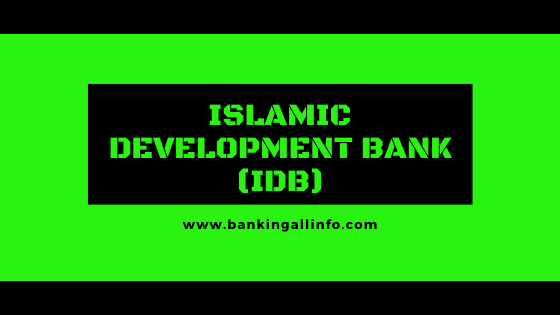Islamic Development Bank (IDB)
Islamic Development Bank (IDB): The idea of establishing an international financial institution for Muslim counties was discussed in the late 1960s by the Organization of Islamic Conference (QIC) Working papers were circulated and proposals made, but no concerted action was taken until the first meeting of the Finance Ministers of the Islamic countries held in Jeddah 1393H (December 1973).
The second conference of finance ministers held in August 1974 adopted the Articles of Agreements establishing the Bank. The Bank began functioning on 15 Shawal 1395H (20th October 1975).

IDB Objectives:
The establishment of the Islamic Development Bank was aimed at contributing to economic development and social progress of its member countries by reinforcing economic co-operation among them, assisting in the development of Islamic economics, banking, and finance, and promoting the economic and social welfare of Muslim communities in non-member countries. In order to realize the above objectives, the IDB is empowered by its Articles of Agreement to engage in the following activities:
1. Participation in the equity capital of productive projects and enterprises in member countries.
2. Investment in economic and social infrastructure projects in member countries by way of participation or other financial arrangements.
3. Extending loans to the private and public sector for the financing of productive projects, enterprises, and programs member countries.
4. Establish and operate special funds for specific purposes including a Fund for assistance to Muslim communities in non-member countries.
5. Operate trust funds.
6. Accept deposits and raise funds in any other manner.
7. Assist in the promotion of foreign trade especially in capital goods, among member countries.
8. Suitably invest funds not needed in its operations.
9. Provide technical assistance to member countries.
10. Extend training facilities for personnel engaged in development activities in member countries.
About IDB: It is a multilateral development bank (MDB), working to improve the lives of those we serve by promoting social and economic development in Muslim countries and communities worldwide, delivering impact at scale.
They provide the infrastructure to enable people to lead better lives and achieve their full potential.
They bring together 57 member countries across four continents – touching the lives of 1 in 5 of the world’s population.
They are one of the world’s most active MDBs, and global leaders in Islamic Finance, with an AAA rating, and operating assets of more than USD 16 billion and subscribed capital of USD 70 billion.
They are a truly global institution, headquartered in Jeddah, Saudi Arabia, with major hubs in Morocco, Malaysia, Kazakhstan and Senegal, and gateway offices in Egypt, Turkey, Indonesia, Bangladesh and Nigeria.
They foster collaboration between our members nations in a uniquely non-political environment, as we focus on the betterment of humanity.
They put the support in place to enable our member countries to grow their economies and societies, so they are ready to embrace the challenges and opportunities of our modern world.
IDB 5 pillars of activity:
- Building partnerships between governments, the private sector and civil society through Public-Private Partnerships (PPP).
- Adding value to the economies and societies of developing countries through increased skills and knowledge sharing.
- Focusing on science, technology and innovation led solutions to the world’s greatest development challenges, through boosted connectivity and funding, and a focus on the UN’s Sustainable Development Goals.
- Promoting global development that is underpinned by Sharia complaint long-term sustainable and ethical financing structures, as global leaders in Islamic Finance.
- Fostering collaboration between our members’ nations in a uniquely non-political environment, as we come together to focus on the betterment of humanity.
Name -Capital subscription -Percentage total capital
Kingdom of Saudi Arabia -11.9bn-23.5%
State of Libya -4.8bn-9.43%
Islamic Republic of Iran -4.2bn -8.25%
Federal Republic of Nigeria -3.9bn- 7.66%
United Arab Emirates -3.8bn- 7.51%
State of Qatar-3.6bn-7.18%
Arab Republic of Egypt -3.6bn-7.07%
State of Kuwait -3.5bn-6.92%
Republic of Turkey -3.3bn-6.45%
Democratic and People’s Republic of Algeria -1.3bn-2.54%
Islamic Republic of Pakistan -1.3bn-2.54%
Republic of Indonesia -1.1bn-2.25%
Malaysia -823.1m-1.63%
People’s Republic of Bangladesh -510.0m-1.01%
Republic of Yemen -258.6m-0.51%
Kingdom of Morocco -256.7m-0.51%
Republic of Sudan —233.0m-0.46%
Hashemite Kingdom of Jordan -219.8m-0.43%
Republic of Senegal -147.8m-0.29%
Sultanate of Oman-142.6m-0.28%
Republic of Iraq -135.1m-0.27%
Republic of Cameroon-128.4m-0.25%
Brunei Darussalam -128.4m-0.25%
Burkina Faso -90.2m-0.18%
Republic of Niger -90.2m-0.18%
Kingdom of Bahrain -72.5m-0.14%
Republic of Uganda -69.0m-0.14%
Republic of Benin -58.2m-0.12%
Republic of Gabon -54.6m-0.11%
Republic of Kazakhstan-54.0m-0.11%
Republic of Mali -50.9m-0.1%
Republic of Azerbaijan-50.9m-0.1%
Republic of Guinea -45.9m-0.09%
Republic of Tunisia -36.4m-0.07%
Islamic Republic of Mauritania-35.8m-0.07%
Republic of Lebanon-35.8m-0.07%
Republic of Mozambique-25.8m-0.05%
Kyrgyz Republic-25.8m-0.05%
Republic of Maldives-25.8m-0.05%
Republic of the Gambia-25.8m-0.05%
State of Palestine-19.6m-0.04%
Syrian Arab Republic-18.5m-0.04%
Republic of Sierra Leone-18.2m-0.04%
Republic of Togo-18.2m-0.04%
Republic of Tajikistan-18.2m-0.04%
Republic of Uzbekistan-13.4m-0.03%
Republic of Cote d’Ivoire-13.0m-0.03%
Union of Comoros-13.0m-0.03%
Islamic Republic of Afghanistan-9.9m-0.02%
Republic of Chad-9.8m-0.02%
Republic of Suriname-9.2m-0.02%
Republic of Albania-9.2m-0.02%
Turkmenistan-5.0m-0.01%
Republic of Djibouti-5.0m-0.01%
Republic of Guinea Bissau-5.0m-0.01%
Federal Republic of Somalia-5.0m-0.01%
Cooperative Republic of Guyana -2.5m
Islamic Development Bank (IDB)
